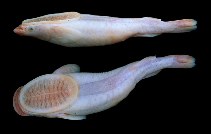| Family: |
Echeneidae (Remoras) |
| Max. size: |
30 cm SL (male/unsexed) |
| Environment: |
pelagic-oceanic; marine; depth range - 200 m, oceanodromous |
| Distribution: |
Worldwide in warm seas. Western Indian Ocean: including Reunion and Mauritius (Ref. 33390). Eastern Pacific: off San Francisco in California, USA to Chile, but rare north of Baja California in Mexico. Western Atlantic: Florida in USA and Gulf of Mexico to Brazil (Ref. 7251). Eastern Central Atlantic: St. Paul's Rocks (Ref. 13121). |
| Diagnosis: |
Dorsal spines (total): 0-0; Dorsal soft rays (total): 17-22; Anal spines: 0-0; Anal soft rays: 21-26. Pale grey to white in color. |
| Biology: |
Host specific on manta rays, but occasionally attaches to sharks. Often occurs inside gill chamber and mouth of host. Also attaches itself to black marlin, Makaira indica, of the Indo-Pacific Region (Ref. 7251). Rarely free-swimming (Ref. 10791). Used in Chinese medicine (Ref. 12166). |
| IUCN Red List Status: |
Least Concern (LC); Date assessed: 01 July 2010 Ref. (130435)
|
| Threat to humans: |
harmless |
Source and more info: www.fishbase.org. For personal, classroom, and other internal use only. Not for publication.
